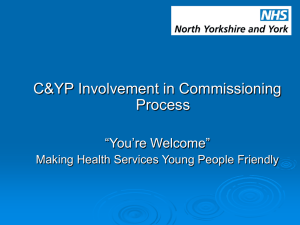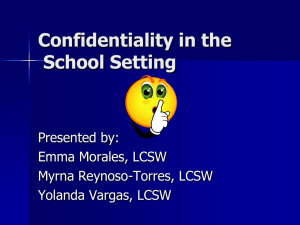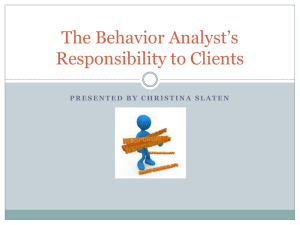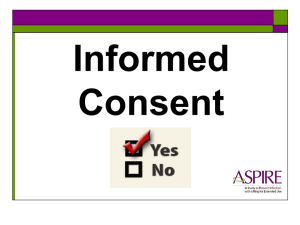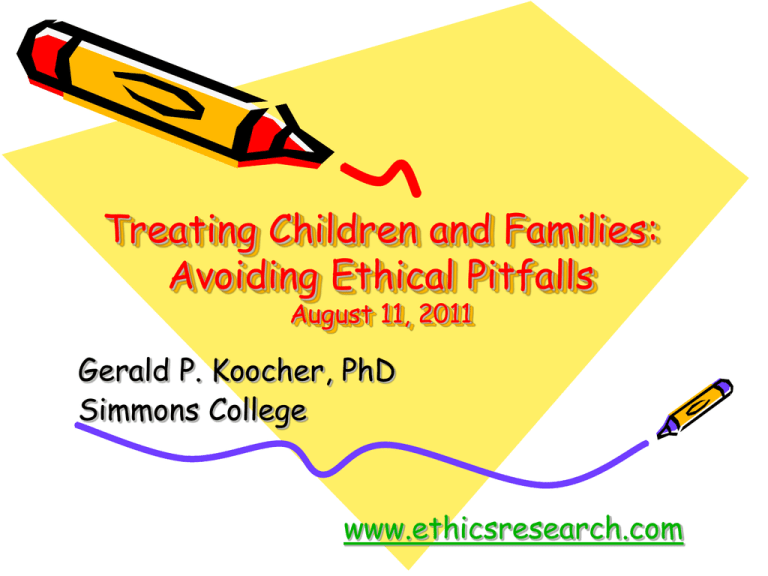
Treating Children and Families:
Avoiding Ethical Pitfalls
August 11, 2011
Gerald P. Koocher, PhD
Simmons College
www.ethicsresearch.com
Focus of the workshop
•
•
•
•
•
•
•
Understanding client status
Confidentiality
Multiple role conflicts
Legal vs. ethical requirements
Mandated reporting requirements
Children in the context of divorce
Working with clients across multiple
levels of jurisdiction including
schools and government agencies.
Ethics vs. Legal Issues
The Culture Gap
Between Mental Health Practitioners and Lawyers
• Mental health
• Lawyers train as
practitioners train in a
advocates.
behavioral science
• Lawyers believe
model.
that the search
• We believe that an
for truth
individual applying
depends on a
rigorous methods can
vigorous
discover significant
adversarial
truths within ranges of
crossstatistical certainty.
examination of
the facts.
Page 4
The Culture Gap
• Mental health
• Lawyers learn to
professionals seldom
“try” or weigh
give dichotomous
facts.
answers to questions. • Lawyers expect
• We prefer to use
clear, precise,
probabilities, ranges,
unambiguous
norms, and continua
decisions, They
that reflect the
seek to establish
complexity of human
bright lines and
differences.
clear dichotomies.
Page 5
The Culture Gap
• Attorneys believe
• We strive to empathize
that they can (and
with our clients and show
must) at times
them unconditional
defend people they
positive regard.
detest.
• Little progress will occur
• Attorneys may
in our work with clients, if
choose not to ask
we do not like/respect
their clients
each other.
certain questions
(e.g., “Did you do
• We constantly collect
it?”) in order to
data and try to ask all the
defend them
important and sensitive
vigorously.
questions.
Page 6
Levels of Proof in the Legal System
Preponderance of
Evidence (51%)
Clear and Convincing
Evidence (75%)
Beyond a Reasonable
Doubt (95%)
Page 7
What Uniqueness to
Kids and Families Bring
to the Mix
Families often include…
• People with non-congruent,
competing, or conflicting interests.
• People who wish to keep secrets from
each other.
• People who do not wish to be totally
candid with each other.
• People with differing levels of
decisional capacity and dependence.
9
People who
want to
keep
secrets
from each
other.
10
People who do not wish to be
totally candid with each other.
• Do I look
fat in this?
• Aren’t my
parent’s
wonderful?
• I’m right,
aren’t I?
11
How are Child Clients
Different from Adults?
• Legal Status
– Minors and Emancipated Minors
• Example: Dominique Moceanu
• Socialization Influences
– The case of Ricky Ricardo Green
• Time perspective
• Concept manipulation abilities
– Piagetian and other Developmental
Frameworks
12
Children’s
Competencies
What are you really asking
for when you say,
“Is that okay with you?”
• Consent
– Competent, Knowing, Voluntary
• Assent
– Veto Power
– Therapeutic versus nontherapeutic context
• Permission
– Proxy Consent
– Substituted Judgment
14
Let’s clean up the terminology
• “Informed consent” as a tautology
– By definition, consent must be an
affirmative, knowing, voluntary act.
• Passive consent as oxymoron
– Consent cannot occur via inaction.
• Delancy et al. v. Gateway School District
• Gateway settles parents' suit over child
queries;February 13, 2001, Eleanor Chute,
Post-Gazette; parents complained their
elementary children had been asked personal
questions without permission in 1995 settled
lawsuit yesterday, includes $225,000 payment
• People participate in studies,
subjects do not.
Essential Components of
Informed Decision Making
• Information
– Access
• Understanding
– Comprehension
• Competency
• Voluntariness
• Decision Making Ability
– Reasoning Capacity
Children’s Competence to Consent
Ask yourself: Does the child have…
• the ability to understand information
offered about the nature and
potential consequences of the pending
decision?
• the ability to manifest a decision?
• the ability to make an appropriate
decision on reasonable bases?
Important Case Law
on Decision Making and Children
• Prince v. Massachusetts, 321 U.S. 158 (1944)
– Parents may not make martyrs of their
children
• Parham v. J.R., 442 U.S. 584 (1979)
• Fare v. Michael C., 442 U.S. 707 (1979)
18
What’s a practitioner to do?
• Focus on
– Competence
– Confidentiality
– Informed consent or
permission from all parties
– Role clarity
– Vigilance, monitoring, and
active management as change
occurs or new issues arise
19
Confidentiality and
Mandated Reporting
Fundamental statement on
confidentiality
• Mental health providers have a
primary ethical and legal obligation
and take reasonable precautions to
protect confidential information
obtained through or stored in any
medium, recognizing that the extent
and limits of confidentiality may be
regulated by law or established by
institutional rules or professional
relationship.
21
Limits on Confidentiality
• Mental health practitioners must
discuss (including, to the extent
feasible, persons who are legally
incapable of giving informed consent
and their legal representatives):
– (1) the relevant limits of confidentiality and
– (2) the foreseeable uses of the information
generated through theirprofessional
activities.
22
Consent to Services
Discussion Topics
• Provide the same basic
information given to individual
clients
• Confidentiality limits
• Access to records
• Normal conflicts of interests in
multiple client therapies
• Children’s rights and limitations in
these situations
23
What principles apply to
informed consent to treatment?
• Inform clients as early as feasible in
the therapeutic relationship about
the nature and anticipated course of
therapy, fees, involvement of third
parties, and limits of confidentiality.
• Provide sufficient opportunity for
the client to ask questions and
receive answers.
24
Comments on Consent
• For persons who are legally incapable of
giving informed consent, nevertheless
– (1) provide an appropriate explanation,
– (2) seek the individual's assent,
– (3) consider such persons' preferences and
best interests, and
– (4) obtain appropriate permission from a
legally authorized person, if such substitute
consent is permitted or required by law.
When consent by a legally authorized person
is not permitted or required by law…take
reasonable steps to protect the individual’s
rights and welfare.
25
Comments on Informed Consent
• When services are court ordered or
otherwise mandated, practitioners
should inform the individual of the
nature of the anticipated services,
including whether the services are
court ordered or mandated and any
limits of confidentiality, before
proceeding.
• We must also document written or
oral consent, permission, and assent.
26
Working with Families and Children
Consent Discussion Topics
• Basic information
given individual
clients.
• Confidentiality limits
• Access to records
• Normal conflicts of
interests in multiple
client therapies
• Children’s rights and
limitations on these
• Rules for disclosure
of info across family
• Reminder that no
one can predict the
course of or
changes in human
relationships
• HIPAA rules
27
Mandated reports
• Who, what, and to whom…
–
–
–
–
Child abuse
Elder abuse
Dependent person abuse
Others…
• Abuse of former client(s) (Minnesota)
• Unsafe drivers (Pennsylvania and pending in
Massachusetts)
• Use of tetrahydrocannabinol or has
alcoholic beverages during pregnancy
(Minnesota)
Twists and Turns in Massachusetts
Mandated Reporting
• Financial abuse of elders is
reportable, but religious treatment
of illness is not.
• Disabled persons may request
privilege from the provider.
• Religious leaders not exempt from
child abuse reporting mandates.
People v Caviani, 172 Mich App
706; 432 NW2d 409 (1988)
•
•
•
•
Mother initiated family therapy with defendant after suspecting that
her husband had sexually molested their nine-year-old daughter.
Defendant, a psychologist and family therapist, rendered therapy and
treatment to the victim, the victim's mother and the victim's father.
During individual therapy sessions in early 1986, the child told
defendant about recurring incidents in which her father fondled her
breasts. When questioned the victim's father made it clear to
defendant that if he had touched the victim, such touchings were
completely accidental and not done for the purpose of sexual arousal or
gratification.
The child later told a school counselor, who reported the incident to
protective services. A petition based on the victim's allegations of
sexual abuse was filed in the probate court. Contending that defendant
had reasonable cause to suspect that the victim had been molested but
had failed to report the suspected child abuse as required.
Buckingham Browne & Nichols &
Edward H. Washburn (1983-1985)
• Washburn turned in by sister, after her
son disclosed abuse by uncle.
• BB&N did not report the incidents to state
officials and attempted cover up.
• Washburn pled guilty.
• School and headmaster fined, psychologist
disciplined.
Psychologist Accused of Failing
to Report Child Abuse
• POSTED: 6:35 am EDT April 9, 2009
http://www.theindychannel.com/news
• NORTH VERNON, IN -- A psychologist
was arrested in his Jennings County office
Wednesday on a charge of failing to report
child abuse or neglect. Police said Dr.
Robert Dailey did not report a case in
which a juvenile suspect in a child
molestation investigation told him of
inappropriately touching another juvenile
during an appointment. The juvenile's case
went through the juvenile justice system.
626.5561, Minnesota Statutes 2007:
REPORTING OF PRENATAL EXPOSURE
TO CONTROLLED SUBSTANCES-- “A person mandated to report… shall immediately
report to the local welfare agency if the person knows
or has reason to believe that a woman is pregnant and
has used a controlled substance for a nonmedical
purpose during the pregnancy, including, but not limited
to, tetrahydrocannabinol, or has consumed alcoholic
beverages during the pregnancy in any way that is
habitual or excessive.
Any person may make a voluntary report if the person
knows or has reason to believe that a woman is
pregnant and has used….
626.5561, Minnesota Statutes 2007:
REPORTING OF PRENATAL EXPOSURE
TO CONTROLLED SUBSTANCES--• An oral report shall be made immediately
by telephone or otherwise. An oral
report made by a person required to
report shall be followed within 72 hours,
exclusive of weekends and holidays, by a
report in writing to the local welfare
agency. Any report shall be of sufficient
content to identify the pregnant woman,
the nature and extent of the use, if
known, and the name and address of the
reporter.”
Duty to Protect Third
Parties for Dangerous Kids
McIntosh v Milano, 1979
• Lee Morgenstern, a teenaged client, told his
therapist (a psychiatrist named Milano) of
sexual adventures, acting-out behavior, and
jealousy related to Kimberly McIntosh, the
young woman next door. The therapist did not
particularly believe him. Later the teen shot
the woman to death, and the psychiatrist was
sued. He sought summary judgment, but it was
not granted, and the case went on to a trial.
The jury ultimately found no negligence on Dr.
Milano's part.
Thompson v. County of Alameda, 1980
• A teenaged juvenile offender named James who was
in county custody threatened to "off" someone when
released from incarceration. Sent home on a leave in
his mother's custody, he tortured a 5-year-old
neighborhood boy to death. The parents sued the
county and advanced the Tarasoff doctrine as part of
their case. The court disallowed application of that
doctrine, because there was no specific identifiable
victim of the teenager's nonspecific threats. In
addition, the court ruled that the official decision to
grant leave and similar correctional release decisions
were immune from liability.
Confidentiality and
Dead People
Confidentiality and Deceased
Patients
– Legal representative of estate have
authority unless specifically prohibited by
state law (HIPAA Privacy Rule)
– Not required if licensed therapist decides,
in the exercise of reasonable professional
judgment, that treating an individual as
personal representative is not in patient’s
best interest (HIPAA Privacy Rule)
Page 39
Still more twists on confidentiality
of dead people
• Middlebrook, D. W. (1991). Anne Sexton: A
biography. New York: Vintage Books.
– Martin Orne, MD, PhD
• Swidler & Berlin and James Hamilton v.
United States U.S. 97-1192.
– Opinion by Rehnquist, joined by Stevens, Kennedy, Souter,
Ginsburg, and Breyer, held that notes were protected by
attorney-client privilege because both a great body of case
law and weighty reasons support the position that attorneyclient privilege survives a client's death, even in connection
with criminal cases.
• Opinion cited: Jaffee v. Redmond, 518 U.S. 1, 17-18, 135 L.
Ed. 2d 337, 116 S. Ct. 1923 (1996)
Page 40
Sharing information about
children’s psychotherapy
with their parents
• Fundamental concept: therapy
has to be safe for all participants
and parents need to know info
about their children that allows
them to fulfill parental
responsibilities.
41
Sharing information about
children’s psychotherapy with
their parents
• Children should have consensual
confidentiality rights.
• Parents should have regular progress
reports.
• Therapists may breach a child’s
confidentiality non-consensually to
prevent serious harm, disclosing only info
necessary for parents to protect.
– Clarify meaning of serious harm to avoid
confusion.
42
Children’s Records Under HIPAA
• In most cases, parents can exercise a right of access
to the medical record on the child’s behalf
– [45 C.F.R. 164.502(g)(3)].
• Regulations permit minors to exercise control
over their own records if, under applicable state
law, they did or could obtain the health care for
which the records are being sought without the
requirement of parental consent, and if the minor
did not ask for the parent to be treated as a
personal representative.
– [45 C.F.R. 502(g)(3)(i)]
Massachusetts General Laws
• Parents have a right to a copy of
their child’s records.
• Children may seek treatment without
parental consent if they believe they:
– may be pregnant or seek family planning advice
– May have a sexually transmitted disease
– Age 12 or older seeking substance abuse
treatment (except Methadone)
– Age 16+ seeking mental health treatment
Emancipated and Mature
Minors in Massachusetts
• Emancipation is a legal status that reduces parents’ rights
and duties toward their child and gives the child some adult
rights.
• Massachusetts does not have a formal procedure for
granting emancipation, but minors may petition for this
status in court.
• Massachusetts does recognize a mature minor rule, which
means that minors can consent to medical treatment—
except for abortion—if the doctor believes the minor can
give informed consent to the treatment and it is in the
minor’s best interest not to notify his or her parents.
Abortion and Minors in Massachusetts
• A minor who is married, divorced, or
widowed can obtain an abortion without
parental consent.
• A minor who has not married must obtain
consent of one parent or guardian. If she
is unable to obtain or chooses not to ask
for consent from a parent/guardian, she
may petition a judge of the Superior Court
to obtain consent
Practitioner
Competence
Standards on Competence
• Mental health professionals should
practice only within the boundaries of
their competence, based on their
education, training, supervised
experience, consultation, study, or
professional experience.
48
Standards on Competence
• An understanding of factors associated with
age, gender, gender identity, race, ethnicity,
culture, national origin, religion, sexual
orientation, disability, language, or
socioeconomic status is essential for
effective implementation of services with
specific populations.
• Practitioners should recognize their
limitations and if not qualified you make
appropriate referrals.
49
ARE YOU CULTURALLY
COMPETENT FOR THE CHILD
POPULATIONS YOU PLAN
TO SERVE?
Take the quiz…
Custody Disputes
Child Custody Cases: Key Advice
• Don’t treat the system
casually!
• Get formal training and
mentored experience.
• Seek judicial
appointment, if possible.
• Clarify roles and
expectations with all
parties at the outset.
Common criticisms of mental health
practitioners in custody disputes
• Deficiencies and abuses in professional
practice.
• Inadequate familiarity with the legal system
and applicable legal standards.
• Inappropriate application of assessment
techniques.
• Presentation of opinions based on partial or
irrelevant data.
More Common criticisms in
custody disputes
• Overreaching by exceeding the limits of
knowledge in expert testimony.
• Offering opinions on matters of law.
• Loss of objectivity through inappropriate
engagement in the adversary process.
• Failure to recognize the boundaries and
parameters of confidentiality in the
custody context.
Elements of Notification in a
Custody Evaluation
• Provide a statement of adult parties’ legal
rights with respect to the anticipated
assessment
– Give a clear statement regarding the purpose of the
evaluation.
– Identify the requesting entity.
• (Who asked for the evaluation?)
– Describe the nature of anticipated services.
• (What procedures will you follow?)
– Explain the methods to be utilized.
• (What instruments and techniques will you use?)
– Specify whether or not the services are court
ordered.
Elements of Notification in a
Custody Evaluation
•
Delineate the parameters of confidentiality.
•
Provide information regarding:
•
Consent documentation
–
–
–
–
–
–
–
–
–
–
–
–
Will anything be confidential from the court, the parties, or the public?
Who will have access to the data and report? How will access be provided?
The evaluator’s credentials;
The responsibilities of evaluator and the parties;
The potential disposition of data
The evaluator’s fees and related policies;
What information provided to the child, and by whom?
Any prior relationships between evaluator and parties;
Any potential examiner biases (For example: presumptions regarding joint custody).
Obtain consent to disclose material learned during evaluation in litigation.
Obtain waiver of confidentiality from adult litigants or there legal representatives.
Provide written documentation of consent.
Consent to Mental
Health Treatment in
Conflicted Family
Situations
Who May Consent to Treatment
for a Minor Child?
• The Child
– Confirm applicability of state laws.
• The Parents
– Joint custody means either parent may consent
unless court decrees state otherwise.
– With joint custody either parent can demand an
end to therapy of minor child.
– Resisting parental demand could result in
disciplinary action.
58
Who Can Consent to Treatment
of Minor Child?
• When legal/physical custody is
divided:
– Seek consent from both parents prior
to evaluating or treating.
– Request copy of divorce decree or
letter from parent’s attorney attesting
to their authority.
59
Who Can Consent to Treatment
of Minor Child?
• When a parent is unavailable or when
parental contact might reasonably be
expected to harm the child:
– Seek consultation.
– Note pros and cons of non-contact in
your records.
60
Parental disputes regarding
child’s treatment
• Consent to your services
does not equal acceptance of
payment responsibility.
– Clarify this in advance,
preferably in writing, with the
party accepting responsibility.
61
Who is the client when a
child enters therapy?
• Does a psychotherapist-client relationship
exist when a parent participates in
services only (or chiefly) to aid the child?
– If parent is not considered a client he/she
should be specifically informed before
professional activities begin.
– Information provided in such contexts is
confidential, but may not be privileged.
– Document the parent’s “client” status in writing
62
Who is the client when a
child enters therapy?
• Usual best option: designate
parents as clients for limited
purposes in your records and
inform them.
63
MULTIPLE ROLE
RELATIONSHIPS
64
Common Trends:
Boundaries & Competence
• Sex
• Suicide
• Child Custody
– Release of records
– Role confusion/conflict
• Confidentiality
• Record Keeping
Therapy Involving Couples
or Families
• When agreeing to provide services to
several persons who have a relationship
(such as spouses, significant others, or
parents and children), reasonable steps to
clarify at the outset
– (1) which of the individuals are clients/patients
and
– (2) the relationship the practitioner will have
with each person. This clarification includes the
practitioner’s role and the probable uses of the
services provided or the information obtained.
66
Therapy Involving Couples
or Families
• If it becomes apparent that you may be
called on to perform potentially conflicting
roles (such as family therapist and then
witness for one party in divorce
proceedings), psychologists take
reasonable steps to clarify and modify, or
withdraw from, roles appropriately.
67
Remember to discuss…
• Rules for disclosure of information
across the family.
• Reminder that no one can predict the
course of or changes in human
relationships.
68
Isn’t it obvious?
• Do not engage in sexual
intimacies with individuals
known to be close
relatives, guardians, or
significant others of
current clients/patients.
• Do not terminate therapy
to circumvent this
standard.
69
Multiple Relationships
• A multiple relationship occurs when a
the practitioner holds a professional
role with a person and
– (1) at the same time is in another role with
the same person,
– (2) at the same time is in a relationship with
a person closely associated with or related
to the person with whom you have the
professional relationship, or
– (3) promises to enter into another
relationship in the future with the person or
a person closely associated with or related
to the person.
70
Multiple Relationships
• Refrain from entering into a multiple
relationship if that relationship could reasonably
be expected to impair your objectivity,
competence, or effectiveness in performing your
functions as a psychologist, or otherwise risks
exploitation or harm to the person with whom
the professional relationship exists.
• Multiple relationships that would not reasonably
be expected to cause impairment or risk
exploitation or harm are not unethical.
71
Multiple Relationships
• If you find that, due to unforeseen factors, a
potentially harmful multiple relationship has
arisen, take reasonable steps to resolve it
with due regard for the best interests of the
affected person and maximal compliance with
the ethical standards.
• When required by law, institutional policy, or
extraordinary circumstances to serve in more
than one role in judicial or administrative
proceedings, clarify role expectations and the
extent of confidentiality at the outset and
thereafter as changes occur.
72
Who’s in the record?
• Mental health practitioners create, and to
the extent the records are under their
control, maintain, disseminate, store, retain,
and dispose of records and data relating to
their professional and scientific work…
– (1) facilitate provision of services later by them or
other professionals,
– (2) allow for replication of research,
– (3) meet institutional requirements,
– (4) ensure accuracy of billing and payments, and
– (5) ensure compliance with law.
73
Involvement of 3rd Parties
• When you agree to provide services to a person or
entity at the request of a third party, attempt to
clarify at the outset of the service the nature of
the relationship with all individuals or organizations
involved. This clarification includes your role (e.g.,
therapist, consultant, diagnostician, or expert
witness), an identification of who is the client, the
probable uses of the services provided or the
information obtained, and the fact that there may
be limits to confidentiality.
74
Psychologists, Kids, and
Schools: Special Ethical Concerns
Who is the Client?
The School Board?
The Principal?
The Parents?
The Child?
Who is most vulnerable?
75
Kids, and Schools:
Special Ethical Concerns
• Organizational Demands versus Child
Client Needs
– Incongruent interests
– Autonomy in the context of
organizational structure
– Service needs and limited budgets
• Forrest v. Ansbach
76
Psychologists, Kids, and Schools:
Special Ethical Concerns within the School
Legitimacy of
token economies,
rewards, and
aversive controls
Use of “time out”
Preventive
exclusion
Post hoc support
for administrative
decisions
Pygmalion effects
77
Psychologists, Kids, and Schools:
Special Ethical Concerns
• Privacy and Confidentiality
– What goes into school records
– Who has access
– “Need to know: paradigm
• Psychologist as “whistle blower” and
mandated reporter in absence of
administration action
78
Psychologists, Kids, and
Schools: Special Ethical Concerns
• School-based research
– Merriken v. Cressman: “prediction of
drug and alcohol abuse” in Norristown,
PA schools opposed by parent and ACLU
– “Opt-out Consent”
• Delancy et al. v. Gateway School District
– Prediction of school-based violence
79
Stigma and Labeling
• Designation as “at risk” creates risk
Kids, and Schools:
Special Ethical Concerns Extending Home
• Substance abuse
• Domestic violence
• Academic
dishonesty
• Disciplinary
actions:
– Detention
– Suspension
– Expulsion
• Attendance
• Misuse of “high
stakes” testing
• Harassment and
bullying (school
violence)
• Social needs
• IEP appeals
81
Problem Cases
Donna Rhea (part 1)
• Donna Rhea, age 15, discloses to her
psychotherapist that she and her
boyfriend are going to “have sex”
this weekend at his house on Friday
night, while his parents are away.
He’s 17 and they have been dating
for 3 months.
Donna Rhea (part 2)
• Donna Rhea, age 16, discloses to her
psychotherapist that she and her
boyfriend are going to “have sex”
this weekend at his apartment on
Friday night. He’s 21 and they have
been dating for 3 weeks.
Donna Rhea (part 3)
• Donna Rhea, age 16, discloses to her
psychotherapist that she is using
drugs purchased from another
student at her high school and is
engaging in unprotected sexual
intercourse with him in payment for
the drugs.
The Runaway Patient
• Becky Splitsky, age 14, calls her
psychotherapist to report that she has run
away from home. Her parents do not know
whether their child is safe and are frantic
with worry. You ask the girl whether she
objects to your letting her parents know
that she is all right, and she says that she
does object.



